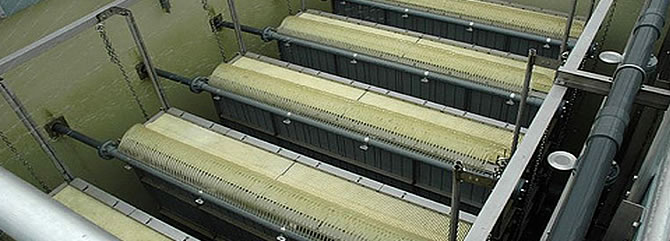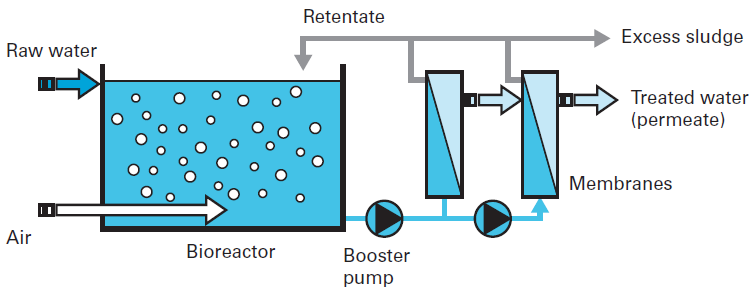The Advantages of Using a Membrane Bioreactor for Efficient Water Purification
The Advantages of Using a Membrane Bioreactor for Efficient Water Purification
Blog Article
How Membrane Bioreactors Are Transforming Water Filtration Solutions
The appearance of membrane bioreactors (MBRs) represents a significant development in the field of water purification, merging biological treatment processes with innovative membrane filtering innovations. This combination not just improves the high quality of treated effluent however likewise addresses urban space constraints, making MBRs specifically suitable for largely booming locations. As worldwide water shortage increases, the function of MBRs in assisting in drinkable water reuse and sustainable water management comes to be significantly important. The ramifications of this technology expand beyond performance-- what obstacles and possibilities lie in advance for its prevalent implementation?
Summary of Membrane Layer Bioreactors
Membrane bioreactors (MBRs) stand for a considerable advancement in water purification modern technology, as they combine biological therapy processes with membrane layer purification. This integration improves the performance of wastewater treatment by making use of microbes to deteriorate organic toxins while at the same time using semi-permeable membranes to separate treated water from suspended microorganisms and solids.
The MBR system commonly is composed of a biological reactor where the microbial population metabolizes impurities, adhered to by a membrane filtering device that preserves biomass and allows only clean water to go through. This twin capability causes higher effluent quality compared to conventional treatment methods. MBRs can be operated in both set and constant circulation modes, using versatility in style and application.
They additionally allow the recovery of water for reuse, hence contributing to water sustainability initiatives. Generally, MBRs are at the leading edge of improving water therapy efficiency and top quality, showcasing the capacity for ingenious remedies in ecological management.
Advantages of MBR Technology
The combination of organic therapy with membrane filtering offers many benefits for water purification procedures. One of the main advantages of Membrane Bioreactor (MBR) modern technology is its capability to effectively eliminate both inorganic and natural contaminants, causing top quality effluent. The membrane layers act as a physical barrier, preventing suspended solids and virus from passing through, which improves the general safety and security and integrity of cured water.
Additionally, MBR systems require a smaller impact compared to standard therapy techniques, allowing for a lot more effective area usage. This portable style is especially helpful in urban settings where land is limited. MBRs additionally demonstrate operational versatility, fitting varying influent high qualities and circulation rates without considerable performance deterioration.
In addition, the procedure uses boosted nutrient elimination capacities, specifically for nitrogen and phosphorus, which are vital for stopping eutrophication in obtaining waters. The lowered sludge production connected with MBR modern technology additionally equates to lower disposal expenses, making it an affordable service in the future - Membrane Bioreactor. On the whole, the benefits of MBR innovation position it as a leading selection for cutting-edge and lasting water filtration systems, resolving both environmental and financial concerns
Applications in Water Filtration
Applications of Membrane Layer Bioreactor (MBR) technology in water filtration are diverse and impactful, resolving different therapy requires throughout several industries. MBRs effectively incorporate organic treatment procedures with membrane filtering, making them optimal for metropolitan wastewater treatment, industrial effluent monitoring, and also safe and clean water reuse initiatives.
In metropolitan click here for info setups, MBRs are increasingly employed to boost the top quality of treated wastewater, permitting conformity with stringent discharge regulations and assisting in the recycling of water for irrigation and non-potable uses. Their portable style additionally makes them appropriate for city environments about his where room is restricted.
Industrially, MBR modern technology is used to deal with process water and wastewater, particularly in sectors such as food and drink, pharmaceuticals, and fabrics. By efficiently getting rid of impurities and put on hold solids, MBRs aid industries reduce ecological effects while recovering beneficial resources from wastewater streams.
Furthermore, MBRs are obtaining traction in decentralized water therapy applications, where small systems can be deployed in remote locations or developing regions. This flexibility allows communities to accomplish lasting water monitoring options, improving access to clean water while reducing reliance on conventional therapy approaches.
Study and Success Stories

In one more instance, a fabric production center in Bangladesh took on MBR innovation to address its wastewater difficulties. The system reduced chemical oxygen need (COD) degrees from 1,200 mg/L to less than 100 mg/L, hence fulfilling regulative requirements and significantly decreasing ecological impact.
The College of Cape Town's MBR setup has confirmed reliable in treating greywater for non-potable reuse on university. This task not only conserves safe and clean water yet also works as an instructional design for sustainable practices.
Moreover, a fish and shellfish processing plant in Norway made use of MBR modern technology to treat effluents containing high degrees of raw material, attaining over 90% pollutant removal. These study underscore MBR technology's adaptability and its vital role in boosting water quality throughout diverse applications.
Future of Water Therapy Solutions
As global water shortage and pollution difficulties escalate, ingenious water therapy remedies are ending up being increasingly vital to make certain lasting access to tidy water. The future of water treatment hinges on the assimilation of innovative technologies that enhance the performance and efficiency of filtration processes. Membrane layer bioreactors (MBRs) are at the center of this evolution, incorporating biological treatment with membrane layer purification to generate top notch effluent ideal for different applications.

Arising patterns such as source healing from wastewater, consisting of nutrients and energy, will further change treatment centers right into environment-friendly centers. Moreover, improvements in nanotechnology and membrane materials promise improved efficiency and durability of filtering systems.

Final Thought
Their role in drinkable water reuse and lasting water management highlights their significance in resolving global water shortage difficulties. Proceeded research and development will even more boost the efficacy and fostering of MBR technology, guaranteeing a durable future for water therapy solutions.
The development of membrane bioreactors (MBRs) stands for a substantial innovation in the area of water filtration, combining organic therapy procedures with cutting-edge membrane filtration innovations. As worldwide water shortage heightens, the function of MBRs in assisting in safe and clean water reuse and lasting water monitoring comes to be significantly essential. They also make it possible for the healing of water for reuse, therefore contributing to water sustainability initiatives.As global water scarcity and pollution challenges intensify, innovative water therapy remedies are becoming increasingly important to ensure lasting accessibility to tidy water. Their function in potable water reuse and lasting water monitoring highlights their importance in addressing international water shortage difficulties.
Report this page